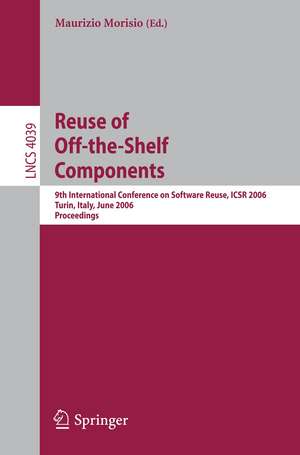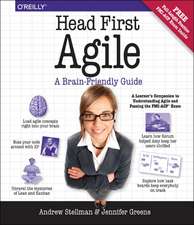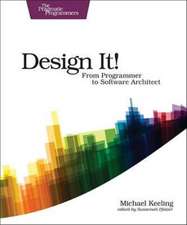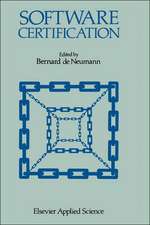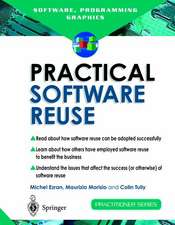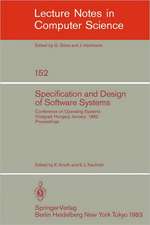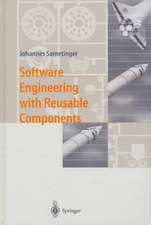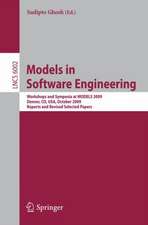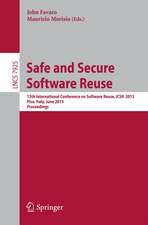Reuse of Off-the-Shelf Components: 9th International Conference on Software Reuse, ICSR 2006, Torino, Italy, June 12-15, 2006, Proceedings: Lecture Notes in Computer Science, cartea 4039
Editat de Maurizio Morisioen Limba Engleză Paperback – 30 mai 2006
Din seria Lecture Notes in Computer Science
- 20%
 Preț: 1061.55 lei
Preț: 1061.55 lei - 20%
 Preț: 307.71 lei
Preț: 307.71 lei - 20%
 Preț: 438.69 lei
Preț: 438.69 lei - 20%
 Preț: 645.28 lei
Preț: 645.28 lei -
 Preț: 410.88 lei
Preț: 410.88 lei - 15%
 Preț: 580.46 lei
Preț: 580.46 lei - 17%
 Preț: 427.22 lei
Preț: 427.22 lei - 20%
 Preț: 596.46 lei
Preț: 596.46 lei -
 Preț: 449.57 lei
Preț: 449.57 lei - 20%
 Preț: 353.50 lei
Preț: 353.50 lei - 20%
 Preț: 1414.79 lei
Preț: 1414.79 lei - 20%
 Preț: 309.90 lei
Preț: 309.90 lei - 20%
 Preț: 583.40 lei
Preț: 583.40 lei - 20%
 Preț: 1075.26 lei
Preț: 1075.26 lei - 20%
 Preț: 310.26 lei
Preț: 310.26 lei - 20%
 Preț: 655.02 lei
Preț: 655.02 lei - 20%
 Preț: 580.93 lei
Preț: 580.93 lei - 20%
 Preț: 340.32 lei
Preț: 340.32 lei - 18%
 Preț: 938.83 lei
Preț: 938.83 lei - 20%
 Preț: 591.51 lei
Preț: 591.51 lei - 15%
 Preț: 438.59 lei
Preț: 438.59 lei - 20%
 Preț: 337.00 lei
Preț: 337.00 lei -
 Preț: 389.48 lei
Preț: 389.48 lei - 20%
 Preț: 607.39 lei
Preț: 607.39 lei - 20%
 Preț: 1024.44 lei
Preț: 1024.44 lei - 20%
 Preț: 579.30 lei
Preț: 579.30 lei - 20%
 Preț: 763.23 lei
Preț: 763.23 lei - 20%
 Preț: 453.32 lei
Preț: 453.32 lei - 20%
 Preț: 575.48 lei
Preț: 575.48 lei - 20%
 Preț: 585.88 lei
Preț: 585.88 lei - 20%
 Preț: 825.93 lei
Preț: 825.93 lei - 20%
 Preț: 763.23 lei
Preț: 763.23 lei - 17%
 Preț: 360.19 lei
Preț: 360.19 lei - 20%
 Preț: 1183.14 lei
Preț: 1183.14 lei - 20%
 Preț: 340.32 lei
Preț: 340.32 lei - 20%
 Preț: 504.57 lei
Preț: 504.57 lei - 20%
 Preț: 369.12 lei
Preț: 369.12 lei - 20%
 Preț: 583.40 lei
Preț: 583.40 lei - 20%
 Preț: 343.62 lei
Preț: 343.62 lei - 20%
 Preț: 350.21 lei
Preț: 350.21 lei - 20%
 Preț: 764.89 lei
Preț: 764.89 lei - 20%
 Preț: 583.40 lei
Preț: 583.40 lei - 20%
 Preț: 649.49 lei
Preț: 649.49 lei - 20%
 Preț: 341.95 lei
Preț: 341.95 lei - 20%
 Preț: 238.01 lei
Preț: 238.01 lei - 20%
 Preț: 538.29 lei
Preț: 538.29 lei
Preț: 340.64 lei
Preț vechi: 425.81 lei
-20% Nou
Puncte Express: 511
Preț estimativ în valută:
65.18€ • 68.24$ • 53.93£
65.18€ • 68.24$ • 53.93£
Carte tipărită la comandă
Livrare economică 05-19 aprilie
Preluare comenzi: 021 569.72.76
Specificații
ISBN-13: 9783540346067
ISBN-10: 3540346066
Pagini: 464
Ilustrații: XIV, 450 p.
Dimensiuni: 155 x 235 x 24 mm
Greutate: 0.64 kg
Ediția:2006
Editura: Springer Berlin, Heidelberg
Colecția Springer
Seriile Lecture Notes in Computer Science, Programming and Software Engineering
Locul publicării:Berlin, Heidelberg, Germany
ISBN-10: 3540346066
Pagini: 464
Ilustrații: XIV, 450 p.
Dimensiuni: 155 x 235 x 24 mm
Greutate: 0.64 kg
Ediția:2006
Editura: Springer Berlin, Heidelberg
Colecția Springer
Seriile Lecture Notes in Computer Science, Programming and Software Engineering
Locul publicării:Berlin, Heidelberg, Germany
Public țintă
ResearchCuprins
COTS Selection, Integration.- A Goal-Oriented Strategy for Supporting Commercial Off-the-Shelf Components Selection.- A State-of-the-Practice Survey of Off-the-Shelf Component-Based Development Processes.- Automating Integration of Heterogeneous COTS Components.- Product Lines, Domain Analysis, Variability.- The Domain Analysis Concept Revisited: A Practical Approach.- Feature Driven Dynamic Customization of Software Product Lines.- Inter-organisational Approach in Rapid Software Product Family Development — A Case Study.- Ontology-Based Feature Modeling and Application-Oriented Tailoring.- The COVAMOF Derivation Process.- A Metamodel Approach to Architecture Variability in a Product Line.- An Approach to Managing Feature Dependencies for Product Releasing in Software Product Lines.- Adaptation and Composition Within Component Architecture Specification.- Reengineering Maintanance.- Re-engineering a Credit Card Authorization System for Maintainability and Reusability of Components – A Case Study .- Odyssey-CCS: A Change Control System Tailored to Software Reuse.- Case Study of a Method for Reengineering Procedural Systems into OO Systems.- Programming Languages and Retrieval.- Reconciling Subtyping and Code Reuse in Object-Oriented Languages: Using inherit and insert in SmartEiffel, the GNU Eiffel Compiler.- Recommending Library Methods: An Evaluation of the Vector Space Model (VSM) and Latent Semantic Indexing (LSI).- Aspect-Oriented Software Development.- Improving Extensibility of Object-Oriented Frameworks with Aspect-Oriented Programming.- Comparing White-Box, Black-Box, and Glass-Box Composition of Aspect Mechanisms.- Achieving Smooth Component Integration with Generative Aspects and Component Adaptation.- Approaches and Models.- A Tactic-Driven Process forDeveloping Reusable Components.- Does Refactoring Improve Reusability?.- Using the Web as a Reuse Repository.- Components.- A UML2 Profile for Reusable and Verifiable Software Components for Real-Time Applications.- Formalizing MDA Components.- A Component-Oriented Substitution Model.- Building Reflective Mobile Middleware Framework on Top of the OSGi Platform.- Goal-Oriented Performance Analysis of Reusable Software Components.- Short Papers.- Establishing Extra Organizational Reuse Capabilities.- Incremental Software Reuse.- Variability in Goal-Oriented Domain Requirements.- Variability Modeling in a Component-Based Domain Engineering Process.- GENMADEM: A Methodology for Generative Multi-agent Domain Engineering.- Product Line Architecture for a Family of Meshing Tools.- Binding Time Based Concept Instantiation in Feature Modeling.- Aspects as Components.- Improving Reuse of Off-the-Shelf Components with Shared, Distributed Component Repository Systems.- Support to Development-with-Reuse in Very Small Software Developing Companies.- A Simple Generic Library for C.- Eliciting Potential Requirements with Feature-Oriented Gap Analysis.- X-ARM: A Step Towards Reuse of Commercial and Open Source Components.- Tutorials.- Implementing Domain-Specific Modeling Languages and Generators.- Metrics and Strategy for Reuse Planning and Management.- Building Reusable Testing Assets for a Software Product Line.- The Business Case for Software Reuse: Reuse Metrics, Economic Models, Organizational Issues, and Case Studies.- Designing Software Product Lines with UML 2.0: From Use Cases to Pattern-Based Software Architectures.- Aspect-Oriented Software Development Beyond Programming.
